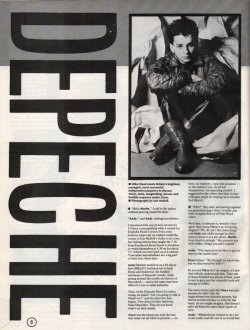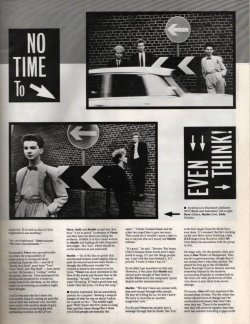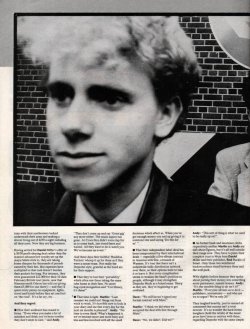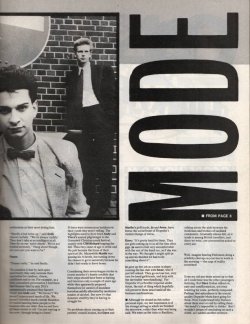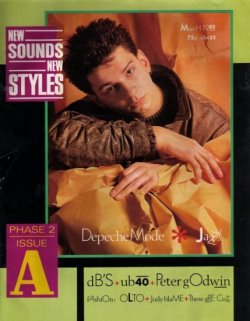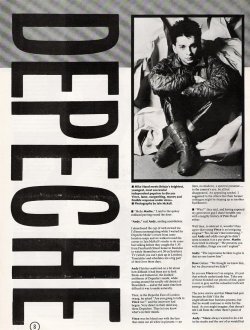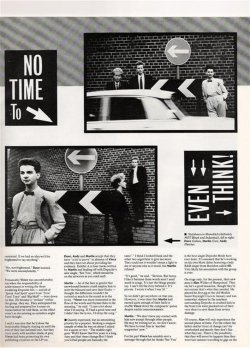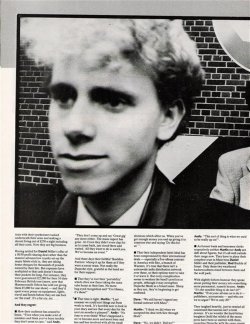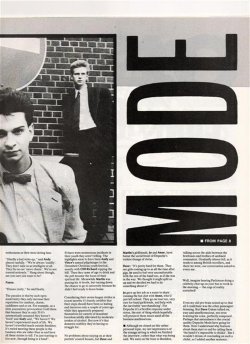No Time To Even Think
[New Sounds New Styles, March 1982. Words: Mike Stand. Pictures: Iain McKell.]
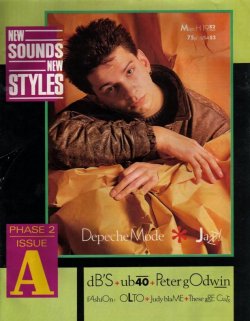
NO TIME TO EVEN THINK
Mike Stand meets Britain’s brightest, youngest, most successful independent popsters to discuss Vince, fame, songwriting, money and flexible response under stress. Photography by Iain McKell.
“Hello Martin,” I said to the spikey redhead peering round the door.
“Andy,” said Andy, smiling nonetheless.
I abandoned the cup of well-stewed tea I’d been contemplating while I waited for Depeche Mode’s return from some location snaps and we walked round the corner to Iain McKell’s studio to do some fast talking before they caught the 5.30 from Fenchurch Street home to Basildon to watch themselves at 6.30 on Southern TV (which you can’t pick up in London). Timetables and schedules are a big part of their lives these days.
Andy Fletcher muttered on a bit about how difficult it had been not to look Bleak and Industrial, the loathed antitheses of Depeche’s Mode, while posing around the scruffy old district of Shoreditch – and at the same time how difficult it was to smile naturally. [1]
Then, in the Depeche East of London twang, he asked, “Are you going to talk to Vince too?” and the interview had begun. Very direct in their mild way, these Depeches. They let you know what’s on their minds.
Vince was the blond one with the face that came out all white in pictures – no lines, no shadows, a spectral presence – to the camera’s eye, he all but disappeared. An appealing symbol. I suggested to the others that their former colleague might be shaping up as another Syd Barrett.
“Who?” they said, and having exposed my generation gap I shan’t trouble you with a lengthy history of Pink Floyd either.
Well then, to abstract it, wouldn’t they agree that young Vince is an intriguing enigma? “No, he ain’t that interesting,” said Andy and oddly enough he didn’t seem to mean it as a put-down. Martin Gore tried to enlarge, “He presents you with riddles, things you can’t explain.”
Andy: “The impression he likes to give is that no-one knows him.”
Dave Gahan: “We thought we knew him, but we discovered we didn’t.”
So you see Vince isn’t an enigma, it’s just that nobody understands him. Take one of those blonded-out photos of him, paint it over in gray and the colourful truth will emerge (a riddle).
The news stories said that Vince had quit because he didn’t like the single / album / tour business process, but that he would continue to write for the band. As you might imagine, that doesn’t tell it all from the other three’s point of view.
Andy: “Vince always wanted to do a lot in the studio and the rest of us would feel restricted. If we had an idea we’d be frightened to say anything.”
“No, not frightened,” Dave insisted. “We were uncomfortable.”
Presumably Vince was uncomfortable too when the responsibility of achievement in writing the three escalating Depeche hits – and all of “Speak And Spell” apart from “Tora! Tora! Tora!” and “Big Muff” – bore down on him. He became a “recluse” within the group, they say. They anticipated his leaving and prepared for it some six weeks before he told them, so the effect wasn’t as devastating as outsiders might have thought.
I said it was nice that he’d done the honourable thing by staying on until the end of their last national tour, but they were ready with another shade of grey: Vince had been promoting his own publishing royalties on the LP too. [2]
Dave, Andy and Martin accept that they have “a lot to prove” in absence of Vince and they have set about providing the evidence. Exhibit A is four tracks written by Martin and leading off with Depeche’s new single, “See You”, which should be on the airwaves as you read nsnS.
Martin – he of the face so gentle that snowbound farmers could employ him to melt the blizzard and save their flocks – thought the difference wouldn’t be noticed so much in the sound as in the lyrics. “Vince was more interested in the flow of the words and rhymes than in the meaning,” he said. “I care a lot about what I’m saying. If I had a good tune and I didn’t like the lyrics, I’d drop the song.”
Quietly expressed, but an astonishing priority for a popster. Seeking a soupcon sample of what he was on about I asked for a quote or two: “The middle eight goes ‘Well I know that five years is a long tome and that times change / But I think you’ll find people are basically the same’.” I think I looked blank and the other two urged him to give me more. They could see it wouldn’t mean a light to me or anyone else as it stood, but Martin refused.
“It’s good,” he said. “Serious. But funny. I like it because those words aren’t used much in songs. It’s just the things people say. I can’t tell the story behind it. It’s private. I wrote it when I was 18.”
So we didn’t get anywhere on that one. However, it was clear that Martin had earned quite enough of their faith to shuffle Vince down the composers’ queue despite earlier announcements.
Martin: “We don’t have any contact with him now except through other people. He may be writing for us, we don’t know. We have to treat him as “another songwriter” now.” [3]
For his part Vince has amiably sent a message through that he thinks “See You” is the best single Depeche Mode have ever done. It’s assumed that he’s working on his own Mute debut featuring a lady R&B singer from Basildon called Alf. Very likely his association with the group is over.
On stage only, for the present, their new man is Alan Wilder of Hampstead. They say he’s a good musician, though they’re not certain that’s what they needed. He played his first gig at the old Modish haunt Rayleigh Crocs in January and was somewhat shaken by the mayhem surrounding Depeche as crushed kids in the front row were plucked out of their very shoes to save them from sever damage.
Of course, Alan will only experience the second phase of fame. For the others the helter-skelter force of change can’t be overlooked and mostly they don’t like what they see. There is the possibility that they will never be happier than they were last summer travelling to gigs on the train with their synthesisers tucked underneath their arms and making a decent living out of £250 a night including all their costs. Now they are big business.
Having settled for Daniel Miller’s offer of a 50/50 profit-sharing deal rather than the massive advance / low royalty set-up the major labels stick to, they are taking home cheques for thousands of pounds earned by their hits. But expenses have multiplied so that cash doesn’t burden their pockets for long. For instance, they were guaranteed £22,000 for their 10-date February British tour (more, now that Hammersmith Odeon has sold out giving them £5,000 for one show) – and they’d spent every penny on equipment, lights, travel and hotels before they set one foot on “the road”. It’s a far cry, etc…
[New Sounds New Styles, March 1982. Words: Mike Stand. Pictures: Iain McKell.]
Detailed and probing article, refreshingly free of the usual "aah! Aren't they sweet!" blather often found in this era, catching the band on the edge between novelty and fame. The band discuss intelligently how not only the loss of Vince but their success in general has forced them to rearrange their lives and the workings of the band - not without its downsides. Decidedly better than average.
" Of course, Alan will only experience the second phase of fame. For the others the helter-skelter force of change can’t be overlooked and mostly they don’t like what they see. There is the possibility that they will never be happier than they were last summer travelling to gigs on the train with their synthesisers tucked underneath their arms and making a decent living out of £250 a night including all their costs. "
Summary: Detailed and probing article, refreshingly free of the usual "aah! Aren't they sweet!" blather often found in this era, catching the band on the edge between novelty and fame. The band discuss intelligently how not only the loss of Vince but their success in general has forced them to rearrange their lives and the workings of the band - not without its downsides. Decidedly better than average. [2244 words]

NO TIME TO EVEN THINK
Mike Stand meets Britain’s brightest, youngest, most successful independent popsters to discuss Vince, fame, songwriting, money and flexible response under stress. Photography by Iain McKell.
“Hello Martin,” I said to the spikey redhead peering round the door.
“Andy,” said Andy, smiling nonetheless.
I abandoned the cup of well-stewed tea I’d been contemplating while I waited for Depeche Mode’s return from some location snaps and we walked round the corner to Iain McKell’s studio to do some fast talking before they caught the 5.30 from Fenchurch Street home to Basildon to watch themselves at 6.30 on Southern TV (which you can’t pick up in London). Timetables and schedules are a big part of their lives these days.
Andy Fletcher muttered on a bit about how difficult it had been not to look Bleak and Industrial, the loathed antitheses of Depeche’s Mode, while posing around the scruffy old district of Shoreditch – and at the same time how difficult it was to smile naturally. [1]
Then, in the Depeche East of London twang, he asked, “Are you going to talk to Vince too?” and the interview had begun. Very direct in their mild way, these Depeches. They let you know what’s on their minds.
Vince was the blond one with the face that came out all white in pictures – no lines, no shadows, a spectral presence – to the camera’s eye, he all but disappeared. An appealing symbol. I suggested to the others that their former colleague might be shaping up as another Syd Barrett.
“Who?” they said, and having exposed my generation gap I shan’t trouble you with a lengthy history of Pink Floyd either.
Well then, to abstract it, wouldn’t they agree that young Vince is an intriguing enigma? “No, he ain’t that interesting,” said Andy and oddly enough he didn’t seem to mean it as a put-down. Martin Gore tried to enlarge, “He presents you with riddles, things you can’t explain.”
Andy: “The impression he likes to give is that no-one knows him.”
Dave Gahan: “We thought we knew him, but we discovered we didn’t.”
So you see Vince isn’t an enigma, it’s just that nobody understands him. Take one of those blonded-out photos of him, paint it over in gray and the colourful truth will emerge (a riddle).
The news stories said that Vince had quit because he didn’t like the single / album / tour business process, but that he would continue to write for the band. As you might imagine, that doesn’t tell it all from the other three’s point of view.
Andy: “Vince always wanted to do a lot in the studio and the rest of us would feel restricted. If we had an idea we’d be frightened to say anything.”
“No, not frightened,” Dave insisted. “We were uncomfortable.”
Presumably Vince was uncomfortable too when the responsibility of achievement in writing the three escalating Depeche hits – and all of “Speak And Spell” apart from “Tora! Tora! Tora!” and “Big Muff” – bore down on him. He became a “recluse” within the group, they say. They anticipated his leaving and prepared for it some six weeks before he told them, so the effect wasn’t as devastating as outsiders might have thought.
I said it was nice that he’d done the honourable thing by staying on until the end of their last national tour, but they were ready with another shade of grey: Vince had been promoting his own publishing royalties on the LP too. [2]
Dave, Andy and Martin accept that they have “a lot to prove” in absence of Vince and they have set about providing the evidence. Exhibit A is four tracks written by Martin and leading off with Depeche’s new single, “See You”, which should be on the airwaves as you read nsnS.
Martin – he of the face so gentle that snowbound farmers could employ him to melt the blizzard and save their flocks – thought the difference wouldn’t be noticed so much in the sound as in the lyrics. “Vince was more interested in the flow of the words and rhymes than in the meaning,” he said. “I care a lot about what I’m saying. If I had a good tune and I didn’t like the lyrics, I’d drop the song.”
Quietly expressed, but an astonishing priority for a popster. Seeking a soupcon sample of what he was on about I asked for a quote or two: “The middle eight goes ‘Well I know that five years is a long tome and that times change / But I think you’ll find people are basically the same’.” I think I looked blank and the other two urged him to give me more. They could see it wouldn’t mean a light to me or anyone else as it stood, but Martin refused.
“It’s good,” he said. “Serious. But funny. I like it because those words aren’t used much in songs. It’s just the things people say. I can’t tell the story behind it. It’s private. I wrote it when I was 18.”
So we didn’t get anywhere on that one. However, it was clear that Martin had earned quite enough of their faith to shuffle Vince down the composers’ queue despite earlier announcements.
Martin: “We don’t have any contact with him now except through other people. He may be writing for us, we don’t know. We have to treat him as “another songwriter” now.” [3]
For his part Vince has amiably sent a message through that he thinks “See You” is the best single Depeche Mode have ever done. It’s assumed that he’s working on his own Mute debut featuring a lady R&B singer from Basildon called Alf. Very likely his association with the group is over.
On stage only, for the present, their new man is Alan Wilder of Hampstead. They say he’s a good musician, though they’re not certain that’s what they needed. He played his first gig at the old Modish haunt Rayleigh Crocs in January and was somewhat shaken by the mayhem surrounding Depeche as crushed kids in the front row were plucked out of their very shoes to save them from sever damage.
Of course, Alan will only experience the second phase of fame. For the others the helter-skelter force of change can’t be overlooked and mostly they don’t like what they see. There is the possibility that they will never be happier than they were last summer travelling to gigs on the train with their synthesisers tucked underneath their arms and making a decent living out of £250 a night including all their costs. Now they are big business.
Having settled for Daniel Miller’s offer of a 50/50 profit-sharing deal rather than the massive advance / low royalty set-up the major labels stick to, they are taking home cheques for thousands of pounds earned by their hits. But expenses have multiplied so that cash doesn’t burden their pockets for long. For instance, they were guaranteed £22,000 for their 10-date February British tour (more, now that Hammersmith Odeon has sold out giving them £5,000 for one show) – and they’d spent every penny on equipment, lights, travel and hotels before they set one foot on “the road”. It’s a far cry, etc…
Attachments
Last edited:

